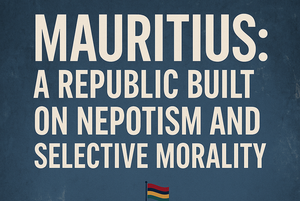In 1968, as the Mauritian flag replaced the Union Jack, hopes for a meritocratic island democracy were high. Instead, within months, the machinery of state was quietly rewired to serve families, party loyalists, and political financiers. The decades since have not dismantled this patronage network — they have perfected it. Today, beneath the glossy brochures of turquoise lagoons and offshore banking hubs, lies a political economy where competence is negotiable, but loyalty is non-negotiable. The price is paid not only in squandered talent and public cynicism but in a slow erosion of Mauritius’s credibility as a rule-of-law state.
The Juman Affair: A Snapshot of a System
The latest flashpoint is the appointment of Nabiihah Juman — daughter of MP Ehsan Juman — to the board of the Competition Commission, the statutory body charged with safeguarding fair markets. On paper, she holds a BA and MSc. In reality, according to press verification, her work experience is far slimmer than presented: a short internship at a Mauritian bank, and since 2020, a directorship at Chantier de Notre Dame Ltée — a company owned by her father.
This is not a case of a prodigy overlooked by the private sector but rescued by the state. It is a textbook example of dynastic appointment: a family member parachuted into a role without the transparent recruitment, open competition, or proven sectoral expertise expected in democracies.
When challenged, Prime Minister Navin Ramgoolam dismissed criticism with a familiar refrain:
“Al tiek enn kou bann nominasion MSM ti fer, lerla ou revinn get mwa…”
(Translation: Go look at the appointments the previous government made before coming back to me.)
This is governance reduced to the schoolyard defence of “they did it, so I can too”. It is also the very logic that fuelled Ramgoolam’s earlier scandals — from the Nandanee Soornack affair to allegations of politically influenced tenders for airport services in the early 2010s.
When Privacy Becomes Public Interest
The Mauritian Constitution does not explicitly enshrine a right to privacy, but under common law and international human rights norms — including the European Convention on Human Rights — public officials enjoy no blanket immunity from scrutiny when their private conduct intersects with public resources. In 2014, l’express published footage of Ramgoolam at a private party hosted by Soornack, a businesswoman whose fortunes rose sharply alongside her proximity to the Prime Minister. The question was not moralism; it was procurement. How does a “housewife turned activist” become a multimillionaire government contractor within a decade? Instead of transparency, kiosks selling l’express-Dimanche were raided. Copies disappeared from public sale. The message was unmistakable: challenge the nexus of politics and patronage, and the state will protect itself.
A Political Tradition of Inheritance
The Juman case is not an aberration but the latest chapter in a post-independence tradition:
1968–1980s: The Ramgoolam, Duval, and Jugnauth families dominate ministerial portfolios and parastatal chairmanships.
1991: Airport operations contracts spark allegations of sweetheart deals to ruling party allies.
2000s: Boardrooms of state-owned enterprises are stacked with party operatives and relatives.
2010s: The Soornack saga reveals a culture where business and political favour intertwine.
2019: Anti-corruption reform bills die in Parliament, leaving the Independent Commission Against Corruption toothless.
2024: The Juman appointment, made without an advertised post or competitive process, reaffirms that state boards remain electoral spoils.
The Economic Cost of Nepotism
Foreign investors, particularly in the financial services and tech sectors, depend on regulatory bodies that are independent, credible, and technically competent. The appointment of underqualified political kin to such boards signals the opposite: Mauritius is a managed market, not a level playing field. The Financial Action Task Force (FATF) greylisting of Mauritius in 2020 was formally tied to anti-money laundering deficiencies, but governance insiders know the subtext: political interference and institutional capture. Repeated patterns of nepotism are not just an ethical failure — they are a compliance risk that could see Mauritius blacklisted, with devastating consequences for its banking sector and GDP.
International Parallels and Warnings
Sri Lanka’s 2022 economic collapse was accelerated by political nepotism that sidelined experts and shielded incompetence. The Maldives saw its democratic reputation tarnished by dynastic appointments in the judiciary and security forces. Kenya’s struggles with public trust in anti-corruption bodies stem from similar political patronage. Mauritius risks the same downward spiral: once credibility is lost, it is almost impossible to rebuild without a generational overhaul of political culture.
Selective Morality and the Ramgoolam Paradox
Ramgoolam’s political brand has long been built on positioning himself as a defender of democracy against authoritarian excess. Yet his own record is marred by patronage, opaque dealings, and international law enforcement interest. The FBI and the UK’s National Crime Agency have, according to credible sources, maintained inquiries into aspects of his financial affairs — inquiries that, if concluded publicly, could rewrite his legacy overnight. For a Prime Minister under that cloud to normalise nepotism is not just hypocrisy — it is strategic. Dynastic politics protect him. They ensure that loyalty within the system is purchased not with principle, but with positions.
If Mauritius truly aspires to be a model democracy and international financial hub, the era of “bachelor’s degree + famous surname = public appointment” must end. Transparent recruitment, merit-based promotion, and an uncompromising firewall between political office and public appointments are not luxuries — they are survival requirements. Until then, Mauritius will remain a republic where selective morality reigns, dynasties thrive, and the Prime Minister’s best defence against reform is the knowledge that, in this game, almost everyone in power is playing the same hand.
